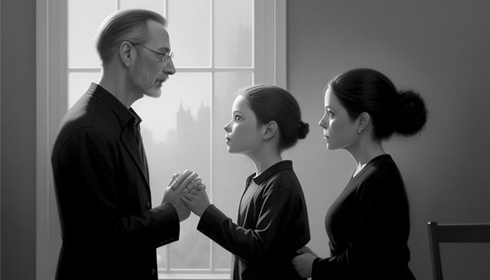
Sensitive Children of Argumentative Parents Suffer from Poor Health
A new study supported by the National Institutes of Health and led by Hannah Schreier, an associate professor at Penn State's College of Health and Human Development, shows that more empathic or sensitive children do worse when they witness parental conflict.
The family home and parents are vital to youngsters between the ages of 7 and 9. "It can be quite stressful to witness parental conflict," Schreier remarked. "We now know that children may respond negatively from a physiological point of view to perceived conflict."
Participating in Family Foundations, a curriculum intended to help first-time parents improve their co-parenting skills, were 106 children between the ages of 7 and 9. The surveys asked the children about their perceptions of parental conflict, including whether they felt responsible for their parents' arguments or if they felt scared. The children also answered questions regarding how much they cared about other people's feelings and whether they felt sorry for them when they were upset. Parents gave their kids' general health ratings, ranging from good to poor.
Researchers examined blood samples from the children to determine their levels of C-reactive protein (CRP) and interleukin-6 (IL-6), two indicators of inflammation in the body. The natural immunological response to inflammation can have short-term benefits, as when an injury heals. Long-term chronic inflammation, however, can cause serious health problems, including heart disease, diabetes, and some cancers.
According to the study, CRP levels rose in empathetic children who witnessed more conflict between their parents, suggesting more chronic inflammation and worse general health. Biological data and self-reported surveys established this.
Significantly, the study revealed that, compared to their less sympathetic classmates, sympathetic kids did not face more conflict at home. Children reported repeated arguments in their daily lives that did not include physical altercations or domestic abuse.
Schreier underlined the relevance of these results for younger children, who have not gotten much attention in earlier research on the physical effects of empathy and conflict. "These results raise interesting questions about children's homes and school environments," the researcher said. "While empathy is important, particularly at this stage of life, it is not logical to mandate that all kids receive more empathy instruction. Some kids could need help figuring out when to set limits and how to find the right mix between thinking about other people's feelings and not taking on every little thing that happens."
The results of the research, which stress the need to cater to the needs of each child, might influence future educational plans. "Our culture's primary message is that empathy is good and that being around other empathetic people is beneficial," says Schreier. But empathy could also backfire. We don't spend much time discussing how to become more empathetic or how it feels to experience others' emotions. Our results add to the increasing amount of research suggesting that developing empathy may be detrimental to your health.
Graduate students Aishwarya Ganguli and Caitlin Givens contributed to this study, as did associate research professor Damon Jones of the PRC and professor of biobehavioral health Jennifer Graham-Engeland.